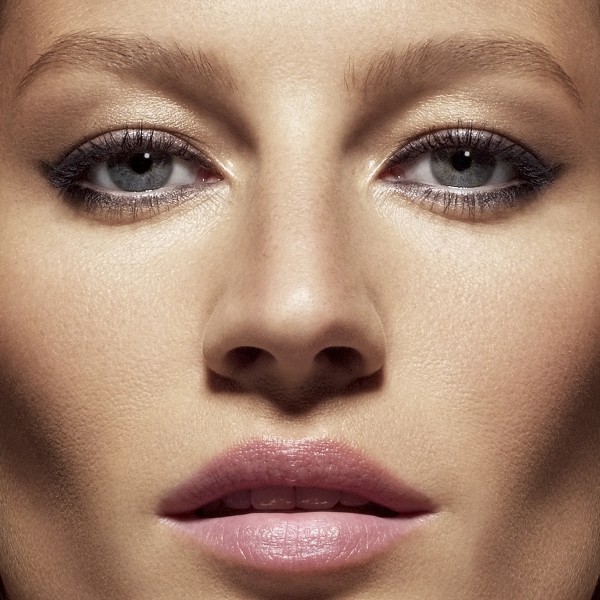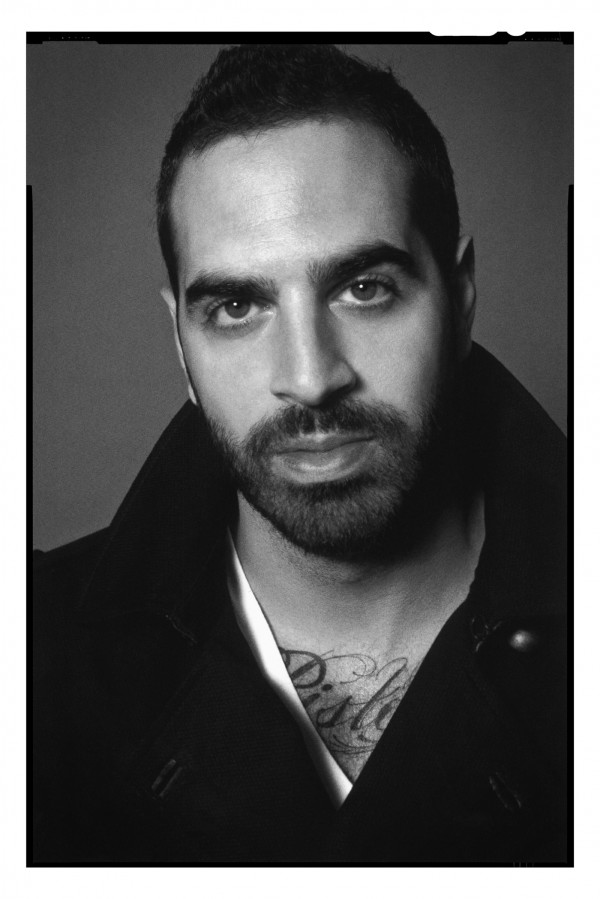
Karolina Kurkova by Tesh.
Retouching, has become a hot button issue within fashion circles. 2009 could go down as the year of Photoshop scandals; whether it is Demi Moore’s supposedly missing hip on the cover of W; or airbrushed to oblivion models, in posters for Ralph Lauren, people noticed something awry. While the outcry over retouching was especially vocal, little has been said by those involved directly in the creative process. To get a better understanding of just how the very public retouching accidents happened, MDC sat down with retoucher, Jason Tuchman. As founder of Pistol Studios, Jason is responsible for some of the most high profile retouching in the business: you may not know his name but you’ve certainly seen his seamless work everywhere from ads to editorials. In our exclusive interview, Jason explains the constraints of retouching and shares what its future may hold. (Interview by Betty Sze, all images courtesy of Pistol Studios)
MDC: What are your thoughts on the retouching backlash?
JT: It all comes down to what every industry is coming down to: budget. Everyone is cutting budgets so the high end retouchers like myself are not getting the budget we used to- or the time to do our work. Now that we’re getting less time- it’s harder to produce beautiful and natural images. Also with the budget cut people are using in house retouchers- junior retouchers to do the work which should be done by senior retouchers. When you get people like that you end up with airbushed images. Everything looks like crap- people are too skinny, the skin is a mess.

Alessandra Ambrosio by Todd Barry
MDC: How does something like the much talked about Ralph Lauren ads happen? Who is to be held responsible?
JT: Nobody. I’m not going to point my finger at the retoucher, I don’t know who the retoucher was and it might not have been their fault. But you know that game you played in kindergarten- telephone? In the advertising industry there is such a large chain of command. Imagine the top, top level says the model looks slightly large- slightly- not even that much (holds two fingers very close together). So it gets passed to the next person and the next person and by the time you get to the retoucher the message is, she’s morbidly obese. Especially now when peoples’ jobs are on the line- the message is skewed. Someone like me, who has been in the industry forever- would not take off that much and would say – no- it will make her body proportion look off and it will be unnatural (to retouch too much). Someone that is at a junior level will not know how to interpret properly and will literally translate the message. It’s not the retoucher‘s fault, it’s not the art director’s fault- it’s misinterpretation.
MDC: What is the future of retouching?
JT: The future of retouching is definitely going to incorporate 3D application. It’s a scary thought for me in what I do and for the photographers I work with. Why do you need a studio and a girl when you can create the girl and the location? Why spend all the money on a product- why hire a photographer and get catering and a studio when it can be made in 3D? We’re not there yet- I give it another 5 years. There are companies that are dabbling in it- I’m not dabbling in it yet because the technology isn’t good enough. I have a 3D background so I will know when it will be realistic enough. When it is good enough and people start really using it- it will change the face of modern photography and retouching and advertising. Whether it’s going to be good or bad, it’s going to happen. In movies now it’s taking place- half of Hollywood are guys sitting behind computers creating characters.

John Varvatos for Converse by Keiran O’Connor.
MDC: What is the process when working with the clients?
JT: Depends whether it’s an advertising job or not. Obviously you want to do physically good retouching but a large part of it is interpreting retouching comments. One art director might say one word and another art director on the same job might say something else but they mean the same. So it’s our job to properly interpret what they want. Once the brain interprets, you have to physically execute the idea. That’s the job of a good retoucher; chain of commands, mark ups, listening for the mark ups, executing the mark ups beautifully and making sure the integrity of the photograph is there. Because at the end of the day I want to have a beautiful looking product- everyone does- the art director does, the photographer does. I have to make sure what I deliver is what everyone envisioned in their head. Even though everyone envisioned something a little different- I want to give everyone a little bit of what they want.
MDC: Why do you think there is such a big debate about retouching?
J: Because of the bad retouching going on. They’re pushing retouchers to the limit. I don’t think it can get much worse. Quality is going out the window and everything will become a 24 hour print shop. In…. out. Which is upsetting to me because it’s my field and what I love to do. It’s kind of degrading.
MDC: What do you think about retouchers receiving credit in editorials alongside photographers?
J: I like it. Retouching used to be taboo. Retouching has been done since the dawn of photography. These days retouchers do so much to the image, I think they deserve a lot of credit. But a lot of people influence the image- hair/ make up- there are so many people involved in an image, the credit list would be huge. So I think it depends on the image. I think if it’s a severe image- in an aesthetic, creative way- then retouchers should be credited because they obviously worked a lot on the image. But I don’t think retouchers are more important than anyone else. So I understand that we can’t always get credit, but I think it should be image dependent.

Gisele Bundchen by Kutlu Ertan.
MDC: Can you give us your background in retouching?
Jason: I started off in a family full of retouchers, they did hand retouching traditionally before computers, so I was exposed to it my whole entire life. That’s not necessarily how I did it, but my whole life that’s all I watched, photo retouching from dyes to negs [negatives], very old school, before computers. So I understood the concepts from it, my whole entire life. And I knew that’s what I wanted to do. I was lucky enough when I was 17 or 18 to get a job at what the time was one of the top companies in the world. It was almost like an all-star cast of retouchers because there were so few companies that people who worked at this specific company were the best retouchers in the world. Everyone’s branched off now, but at that one point in time I was sitting in a room with the top retouchers around. I was 18 and new to it, this was my first job. I was learning techniques that you can’t learn in school, techniques that were proprietary to a lot of people who worked there, and then over the years I’ve developed techniques of my own that no one knows about, like my own proprietary styles. That was pretty much my background in retouching.
MDC: Can you expound on that work experience being so young at a company like that first company.
Jason: You will never get a company like that company was when I worked there- with the top retouchers in the world-, ever again because they are too many retouching companies now. It was really a great experience, and the cool experience about it was, that I WAS so young. I’m still one of the youngest in the industry because I just started off so young, but back then, they used to call me “Wonder Child” there because I was 18 years old working on Steven Meisel’s images. The reality was, it was the dawn of the digital age, so no one knew what the hell they were doing, even the people who’ve been retouching by hand for 20 years, or the people who’ve been retouching on these other proprietary systems before Photoshop… everybody was new. And in some ways, that was why I was blossoming because I was just getting into computer work myself. I almost knew more about Photoshop than they did, because in high school I was such an introvert, all I did was stay at home and teach myself Photoshop. And these guys weren’t even learning Photoshop yet. So, we were all kind of learning digital together. We were all babies in a growing field. It was a really fun time, it was exciting.
MDC: What do you think about the common used phrase heard on set “Oh we’ll just have the retoucher clean it up.”
JT: God bless them because I make more money that way! But the reality is, is that people, they have such the mentality now that “Oh the retoucher will fix it,” that they don’t do it on set, like, taking care of fly away hairs or dirty floors. They used to pin the clothes so it would fit the model nicely. Now they don’t do any of that stuff, now they’re like, “Oh we’ll just do it in post [production].”  But that goes back to the quality issue which we talked about before. Let’s say you give me 4 hours to complete an image, which is still, compared to what it used to be, it should have been 15 hours, but you give me 4 hours. That 4 hours I probably could’ve made that image look stunning, beautiful. But now you’ve taken all that time to have me cleaning floors and fixing clothes and removing bad fly away hairs that someone good could have just went in there and just went (acts out fixing an imaginary hair). You know what I mean?  Those are quick things to do. So it’s like, you have to pick and choose. Do you want me to make an image look beautiful, or do you want me to just to clean the damn thing up because you were too lazy on set to do a lot of the things you should have? You know, even lighting… people doing bad lighting. “Oh we’ll do the mood and the color in photoshop”. It’s like, capture it in the camera, get the feel, you know, let me take something and make it stunning.  Something you’ve already made stunning and make me do something different to it to make it even better, as opposed to just fixing up peoples’ lazy mistakes.
MDC: What did you say to me before? You said that anyone with a clone stamp tool…
JT: Anyone with a copy of Photoshop calls themselves a retoucher now. You know they don’t realize that, I can’t speak for most people, but I think I can speak for myself, that I’ve spent my whole life honing this craft, it’s all I’ve done. You know, these new people did a little bit here and there, messed around with their friends’ photos, and now they’re going around literally getting business cards made; so and so is a retoucher. It’s like, you’re not a retoucher, you know how to use a little bit of Photoshop maybe…. You clone out a pimple, remove a little redeye, maybe do a little skin retouching. God forbid you know how to color correct, all they understand is contrast, which to me, a good photograph is the opposite, it’s not contrast. Then unfortunately, you know, as the industry shifts, the old people leave, the young people come in, the young people are only exposed to the hacks. They’ve never seen good retouching. Their idea of good retouching IS what these people are showing them, they think that is retouching. You know, they see stuff like ours and then they’re blown away, and then they understand. But then they hear our price, and they’re like, “That’s insane.” But… that’s what you pay for.

Jason Tuchman, founder of Pistol Studios.







